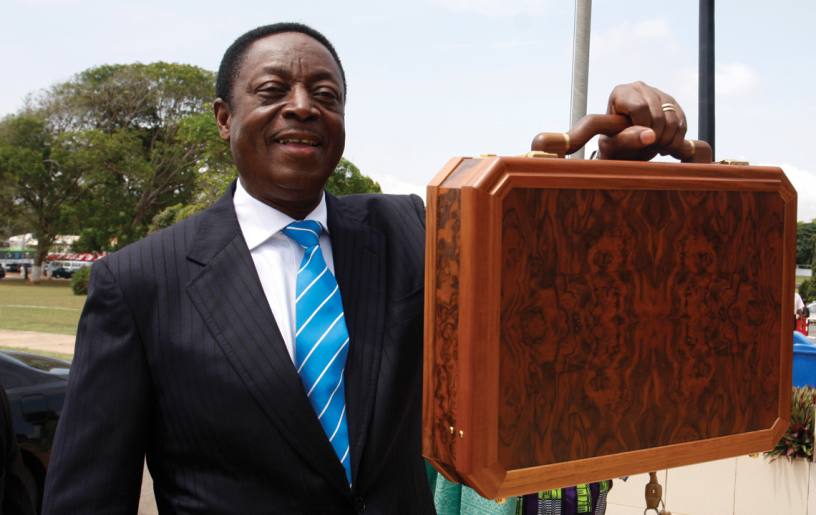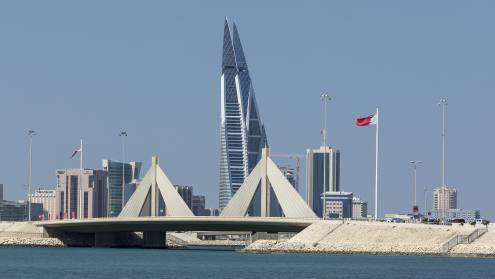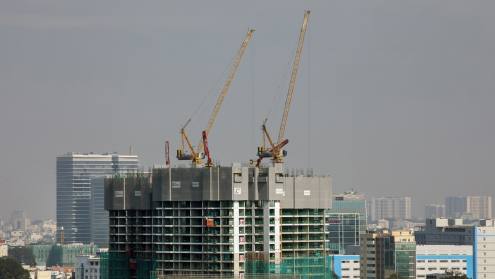Ghanaians have taken great delight from the strength of their economy over the past few years. The country’s gross domestic product (GDP) rose by 8% in 2010 and a huge 14% a year later, making it by some estimates the fastest growing in the world. “We pride ourselves on that,” says an analyst in Accra, the capital city.
The ruling National Democratic Congress (NDC), which came to power in 2009, hopes this economic record will help win it another term when elections are held in December. “We’ve done better in three years [than the previous government],” says Kwabena Duffuor, minister of finance and economic planning. “Why wouldn’t Ghanaians be happy with us?”
Some critics, including the main opposition New Patriotic Party (NPP), counter that much of the expansion has come as a result of oil, rather than the NDC’s policies. Having discovered the vast Jubilee field off its coast in 2007, Ghana began pumping crude in late 2010, greatly boosting its export revenues.
Mr Duffuor admits that the impact of hydrocarbons on Ghana will be profound. Nonetheless, he insists that with oil production being so nascent – still totalling only 80,000 barrels a day – growth is currently being propelled by the rest of the economy, which was responsible for as much as 60% of the increase in GDP last year. “All the sectors are growing very fast,” he says. “Mining is doing very well. So are construction, telecommunications and the financial sector. Therefore, the growth of the economy is not all due to oil.”
Agricultural focus
This emphasis on non-oil industries is partly to assuage fears that Ghana might become overly reliant on the commodity. Mr Duffuor says there is no chance the government will neglect sectors such as agriculture, gold mining or manufacturing. He cites cocoa production, which reached 1 million metric tonnes for the first time last year. “The idea is to make sure we increase our acreage,” he says. “Years ago, we were the world’s biggest cocoa producer. We lost the position to Côte d’Ivoire. We want it back.”
Other crops are also being targeted. While agriculture is Ghana’s main employer and makes up about 30% of economic output, the country is far from fully exploiting its potential. With less than a quarter of arable land cultivated and a reliance on subsistence and rain-fed farming, it remains a net food importer. Mr Duffuor says improvements have been made, particularly with rice, the local supply of which was boosted by the imposition of import tariffs in 2010. But he says more needs to be done to increase productivity. “We do not want to become an oil producer whose agriculture sector is destroyed,” he says. “That’s not our strategy. Ours is to make sure that we have a very big, vibrant, modernised agricultural sector, in which the bulk of our people will [work].
“We want to get into commercial agriculture. That way we’ll be able to export, not import. Right now we’re importing rice. That’s not good enough.”
Better infrastructure will be crucial to Ghana’s long-term prospects. Poor roads, railways and electricity shortages are constantly hindering businesses. To help rectify this, the NDC has negotiated a $3bn loan from China Development Bank (CDB), which will be used to fund several major projects, including developing the country’s gas, transport and telecommunications networks.
The loan, one of the biggest provided by CDB to a foreign country and the first part of $9bn of credit lines signed with Chinese state-owned banks, has proved controversial locally. The head of the NPP has said that if he wins this year’s elections he might renegotiate the terms, especially a provision giving Chinese firms about 60% of the project contracts. But Mr Duffuor says Chinese construction companies have long been present in Ghana and that the agreement is a sign of confidence in the government’s economic management. “[CDB was] impressed by our growth, sincerity and commitment to build the economy. Why else would it give us $3bn?” he says. “I don’t see any problem. Most of the Chinese contractors [in Ghana today] were brought in by the NPP. We didn’t bring them in.”
Cedi woes
Despite Ghana’s fast economic expansion, its currency has been one of the worst performing in Africa this year, falling 15% against the dollar by mid-June and causing inflation to rise from 8.6% in December 2011 to 9.3% in May.
Mr Duffuor says this weakness and the resulting fall in demand for cedi assets among foreign and local investors have hurt the government, whose five-year funding costs climbed from 16% in December to 26% in early June. “We know that the depreciation of the cedi has serious implications for fiscal management,” he says. “The budget has been affected by the depreciation.”
Much of the blame lies with soaring imports. Although Ghana’s exports rose from $8bn to $13bn in 2011, mostly due to oil, its imports increased by just as much – from $11bn to $16bn. This left it with a hefty current account deficit of 9.4% of GDP.
But Mr Duffuor, a former central bank governor, says excess liquidity was more of a problem. Since 2009 this has increased considerably, thanks to public sector wages being hiked, the NDC paying down about 3.5bn cedis ($1.8bn) of arrears built up by the previous government, and farmers getting higher prices for cocoa. “The first year we were in power, we had to pursue austerity measures to slow down the economy,” he says. “That year, the growth rate was just 4%. But from 2010, we’ve grown very fast. We have pursued a growth agenda and we’ve injected a lot of liquidity into the system.”
Central bank aggression
Mr Duffuor says that the Bank of Ghana could have moved quicker in the last quarter of 2011, when the cedi started to slide, to tighten monetary policy. “The situation we’re in is that of excess liquidity,” he says. “I think we didn’t start early enough. With all this liquidity in the system, the mopping [up] by the central bank should have been stronger. Yes, imports have been increasing quickly. But when they take the form of equipment for the oil industry and other infrastructure facilities, they will not lead to inflationary pressures.”
The central bank has taken a much more aggressive stance in recent months to support the cedi. It put up interest rates from 12.5% to 15%, intervened in the foreign exchange market by selling dollars and made banks hold all their reserve requirements in cedis, regardless of the denomination of their liabilities. Mr Duffuor, pointing to high demand during bond auctions in the past 10 weeks, including from foreign investors, says these moves are already working. “I believe the cedi will soon stabilise because the measures taken by the central bank are all aimed at reducing the base money,” he says. “It may take some weeks, but it will stabilise.”
Analysts largely agree, although many think that the cedi’s decline will not be fully halted until 2013 and that inflation will rise to double digits by the end of this year.
No spending binge
Ghana’s governments have a history of ramping up spending in the run up to elections. The NDC denies it will fall prey to those temptations, however. Mr Duffuor says that while the budget deficit is forecast to rise from 4% to 4.8% this year, his government’s commitment to fiscal discipline was exemplified when it prolonged an extended credit facility with the International Monetary Fund (IMF) in July, when it was due to end. This should ensure close scrutiny of public finances before the polls. “We extended the programme with the IMF to make sure we don’t destroy the economy because of the elections,” he says. “It will not happen. We’re committed to keeping fiscal discipline. There’s no virtue in irresponsible fiscal [management].”
Ghana should aim to have a fiscal surplus eventually, says Mr Duffuor. Analysts doubt this will be possible if fuel subsidies, which make up a large chunk of spending, remain in place. Mr Duffuor agrees they should be slashed. But, wary of the political sensitivities surrounding subsidies, he says now would not be a good time to do that. “For years we had adopted a gradual adjustment of petroleum prices,” he says. “But now we are unable to do it because of the cedi’s depreciation. When a currency’s depreciating, you don’t go in for adjustment of petroleum prices. You would create a very difficult situation for the people. But we don’t enjoy having subsidies. In the long run, it’s not good.”
While the removal of subsidies might not be an immediate priority, cutting the public sector pay roll, which has risen to more than 6bn cedis a year, is. Mr Duffuor launched a biometric audit in late 2010 to route out fraudulent claimants. The review of the pension system, which has already been completed, revealed "a lot" of ghost names, according to Mr Duffuor.
He believes by the time the audit of the active pay roll is finished – probably later this year – he will be able to shave 25% off the public sector wage bill.
The IMF says these cuts, together with those from eliminating fuel subsidies, would save Ghana almost 2bn cedis a year, more than double what it currently earns from oil.












